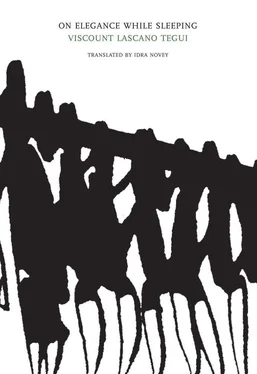“I’m not going to say he was the Don Juan known as the Comte de Lauzun, who supposedly slept with Louis XIV’s sister — not at all. He was a tall man, with a majestic stride, brown hair, green eyes. There was no intrigue about him. Nobody would have said he was an exotic sort. His physique wasn’t what you’d call impressive and his clothes weren’t elegant. He was a man — simply a man — neither seductive nor disagreeable. He went home early every night to his bachelor quarters. His nights were long. He was past his prime. No longer chasing after women. But under his exterior calm, the old viper inside him hadn’t grown old in the least. Like some sinister laboratory tucked away at the far end of a vacant lot, or hidden behind the shady trees at the back of a hospital, he was discreet and terrible, having taken refuge in his bachelor’s quarters only to refine and concentrate his art.
“What could this Don Juan do in the silences of his life? Write and dream alone. He filled his time writing letters. First he would write out multiple drafts that he’d read aloud to himself and of course adore. Then he’d recopy these and pepper them with plenty of adjectives, employing the clumsy style of an un-lettered amateur, but still full of all the requisite poetic imagery, since, he said, ‘Women are birds you must hunt with metaphor.’ This self-deluded magician even had the cleverness to seal his letters with a tear shed in the loneliness of his nights! All this effort no doubt was intended to increase the trivial charm of his epistles — in much the same way as an actor will make himself cry real tears on stage in order to convince you that you are watching an excellent performance.
“After finishing his latest missive, this old bachelor would open his window to listen to the beating heart of the night. Until this moment his bedroom had been hermetically sealed — he could only write when absolutely isolated at his desk. If outsiders could see him there, his love-missives would’ve been cheapened by this exposure…or he would have lost a little dignity, revealed in all his solitude…but, in any case…he died writing. Each of his letters was like La Peau de chagrin —baring his soul, his great spiritual devotion…His letters were a way of maintaining his persona, you see: he couldn’t bear to see himself as a failure. He liked to say to women, ‘You know, my dear, our souls are just so many little pieces of paper,’ and he said this precisely because he hoped that, if anyone gathered up his correspondence, they would find his soul there intact…like the painted scene we reassemble through the reconstruction of an ancient Etruscan vase.”
JULY 9, 18—
Did my father intend to make something of me? I don’t know. I was seventeen and only went home to eat or sleep. I spent the rest of the day along the river or at our neighbors’. Not because I was much of a conversationalist, but it’s nice on occasion to return to something resembling civilization.
Now and then someone died in the next town over, Croissic, where I went sometimes, more or less mechanically, crossing the bridge that leads away from the heart of Bougival. The town crier would announce the death, always trying to end on a cheerful note. Since his trade was an endangered one, the crier did everything he could to get the neighborhood’s sympathy. Whenever he gathered a crowd, following his usual drum roll, the crier would turn to comedy…
The people who died were generally unknown to me. Women who’d spent their lives in the shadows of their own pantries, confining themselves to their rooms or beds in their final years. Raising my eyes toward the peculiar windows of many a small town, I’ve surprised plenty of these lifelong maidservants who never so much as take a little walk down the street to get some sun. Faded old women, the majority of them, who didn’t bother with brushes or combs, keeping their hair in place with ribbons, as was the style in 1830. Some of them were skinny and faded but others had faces that had grown wide and snub-nosed from so much staring — like Sœur Anne, the sister of Bluebeard’s last wife…
These women generally died between the ages of ninety and ninety-five. The official statistics from the mayor’s office would prove me right. The thought of anyone living for so many years made me a little emotional. I never missed their funerals. I followed their processions as though walking behind an itinerant Peripatetic philosopher, reflecting on the fact that these women now on their way to their graves never experienced a day in their lives that was more intense or important than any other: the years had simply been a continual autumn for their souls, which shed one leaf at a time until they were bare — even the birthdays just another little loss. Those pitiful centenarians, who shriveled like oranges in their miserable skins, acquired something in death that moved me…the way the plaintive notes of a cathedral organ might move me as well.
Was it the satisfaction of knowing life wouldn’t be sullied by these women any longer? Was it the sense that the earth was somehow taking a belated revenge upon them that made me happy? That the earth that was going to fold these already mysterious old ladies into its subterranean mystery? I don’t know what it was, really. But suspecting that my own end wouldn’t be too long in coming, those old women’s deaths gave me just as much pleasure as the prospect of having to watch my brilliant youth waste away in some moth-eaten chest of drawers in the granaries of my gray village — pulverized by the great cumbersome bulk of time — made me absolutely miserable.
Their funerals truly moved me. These old women had exhausted life, drinking up even more air than the young. In their homes, bottled up along with their fortunes, rents, retirement money or state pension, they’d retained throughout their lives all the skittish self-interest of those people who never bother to put up a fight, but simply withdraw, preemptively, when there’s any fear of losing ground — sealing themselves in their rooms as if in a fort. Above all, however, these women moved me because they’d been virgins for ninety years — far longer than Joan of Arc had suffered from that affliction. As long as the statues of Joan of Arc.
JULY 18, 18—
Generally, the trips that my friend the coachman took me along on were from the stables to Mont Valérien. Happy as the dawn, my charioteer would depart for Paris, estimating his day’s tips. But one winter night I found him along the road from Chatou to Rueil, along the Seine, his coach was tracing a series of S s like a staggering drunk. Not really wanting to, he accepted my company on the coachbox. He talked to himself. After some time, he decided to explain the cause of his uneasiness — his voice hoarse, croaking with rage, bombastic, as he affirmed the following (letting his reins fall in the process, always the sign of a coachman who’s lost control):
“Look — when you hear that someone’s snuck into a jeweler’s through the sewers or the municipal water pipes and the walls have been drilled through and the tile floor’s been ripped out, the perpetrator is almost certainly a hunchback.
“Did you know that by the fourth century, there was a distinct race of hunchbacks flourishing in the Byzantine Empire? Today this race is nearly extinct, though new, atavistic examples occasionally recur. The few specimens still alive come out only at night, under the arch of the railway bridge.
“When the signal lights go from red to green and, as happens from time to time, two trains collide on the tracks, it’s not unusual for a hunchback in a nearby hovel to step out to entertain himself with the crunching of their vertebrae, the grand horrific spectacle of two mathematical axes meeting in a terrifying geometrical equation, their polygons making nonsense of the imaginary points once delineated by their locomotives, not to mention the impassive parallels of their tracks. It is the hunchback, you see, who’s engineered these astounding and macabre orgies of destruction, walking happily through the carnage thereafter to gather up, where he may, those pulpy bits of brain that, in the ashes of the inferno, look like giant mushrooms that have sprouted from this new lake of blood, upon which float the dining car’s silver serving trays, and from which, in places, one may see the silver handles of drowned sugar bowls reaching into the air. The hunchback amuses himself by fishing out the bowls while the surface of the pool of blood coagulates according to the same fatal law that produces a crust of salt at the edges of the Dead Sea…
Читать дальше












